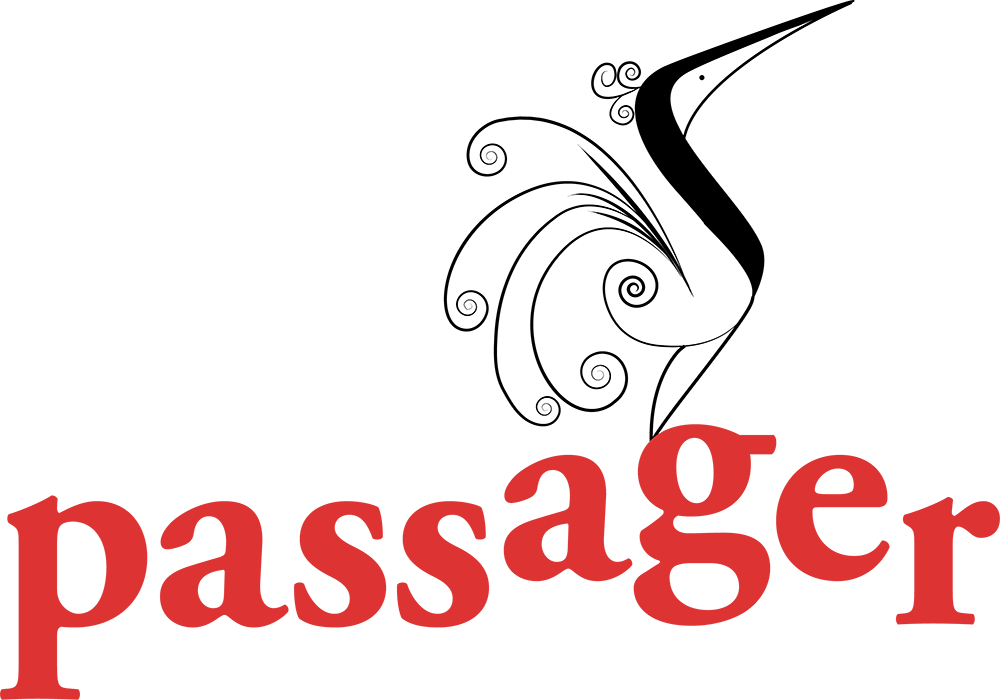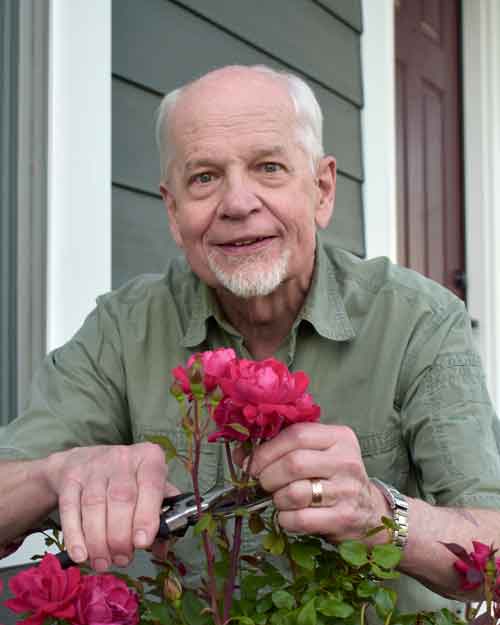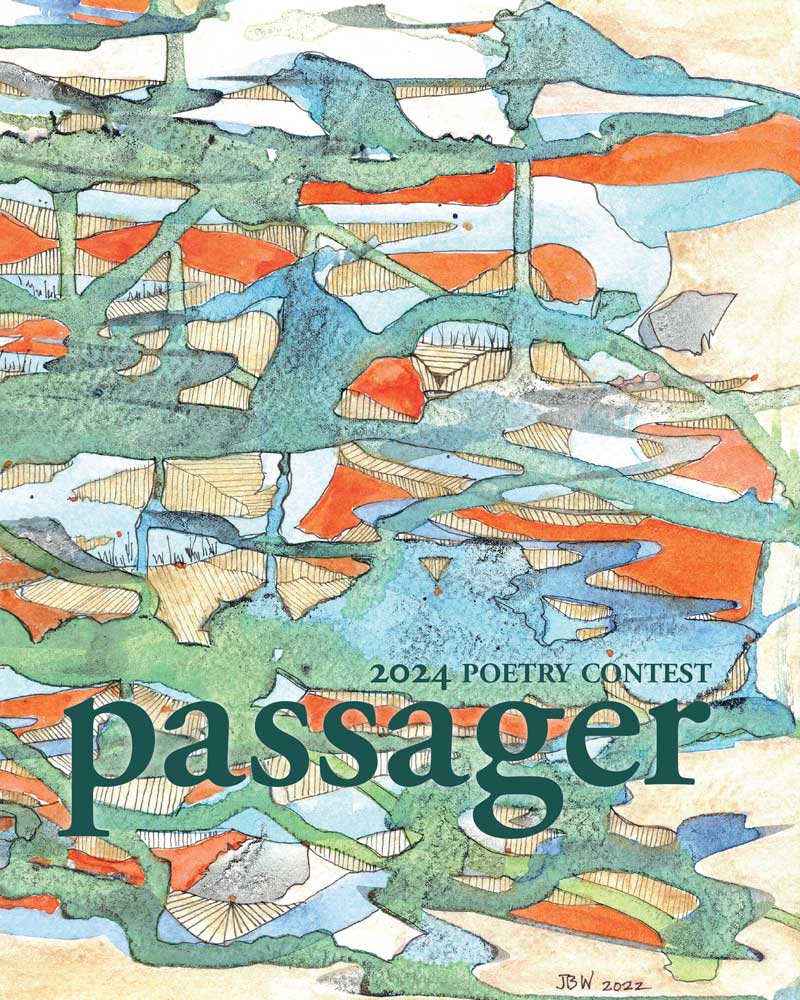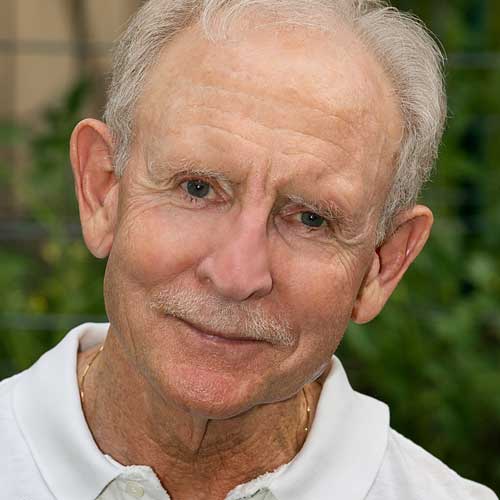Meet the 2024 Passager Poet
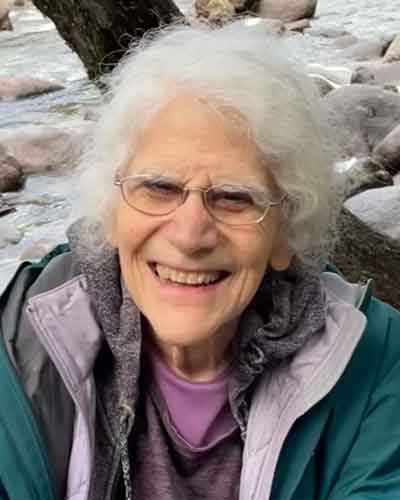
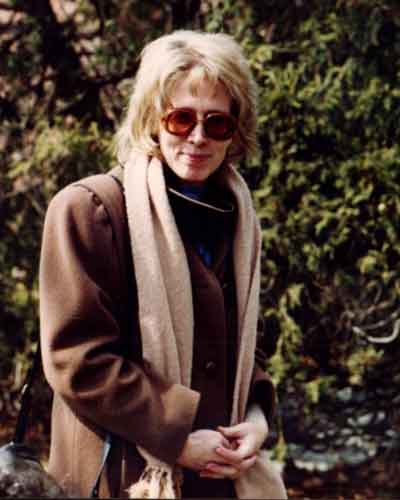
A special episode featuring an interview with 2024 Passager Poetry Contest winner Joyce Schmid.
13 minutes
TRANSCRIPT
She was in a poetry workshop with Robert Lowell. And it was very hard to get into that workshop. People were hanging out the doors trying to listen to it, you know. And so she was a pretty good poet; she got in. And so the first class, Robert Lowell says to the selected students, “Who is your favorite poet? There’s no right or wrong answers.” So, you know, first a Harvard student said, “Well, I have to take the Bard.” The second one said, “Oh, you, sir.” And Dolly said, “Edna St. Vincent Millay.” And Robert Lowell looked at her. And he said, “Well, I guess there are wrong answers.”
That was Joyce Schmid talking about her sister Dolly. Joyce was the winner of the 2024 Passager Poetry Contest. The brand new issue of Passager features five poems by Joyce about her sister.
Passager intern and Middlebury College student Ruby Taylor interviewed Joyce about her poetry, her influences and more. This episode of Burning Bright features excerpts from that interview. And here’s Ruby!
RUBY: Thanks, Jon. I have to say that I was a bit nervous about interviewing an award-winning poet. But I lit a metaphorical candle, said my prayers, and sent a zoom link across the country to Joyce Schmid. My anxiety quickly dissipated. In addition to being a brilliant and thoughtful poet, she’s a deeply kind and effusive presence. Joyce and I discussed her favorite poets, her own writing process, her experience growing up around literature and music, and her late sister Dolly. She said her poetry career began at age two with “a potty-related rhyming bit of gobbledygook.” It almost ended a few years later, but she persevered.
JOYCE: The next poem, I remember writing after that one was a poem I wrote in elementary school. And I showed it to my uncle, who later became an English professor. And he said, that is really trite. So I didn’t write again until high school. And then I wrote a little bit in high school. Most of my life, I just wrote when I was upset about something. And so I would only write a couple of things a year.
RUBY: As an older adult, Joyce began to approach her work more seriously.
JOYCE: Maybe eight years ago, I thought, you know, I’m getting old. I think if I’m going to write poetry, this is the time. So I signed up for my first poetry workshop at Stanford, and I wrote something every single morning, I would get up early, and just write something every morning. And I did that probably for two, three, maybe four years. Stanford gives some wonderful classes in their continuing studies. And I just saw this poetry workshop. And it was such good luck that I found that because it was given by a lady named Kimberly Gray, who is an excellent, wonderful poet and just one of the world’s best teachers. And It just makes you want to write. I wrote a lot about the natural environment, you know, where I would walk and what I would observe. And I wrote a lot about the drought. I live in California, and California was in a drought. I wrote a lot about that. I wrote mostly, I think, about my husband and our relationship and just how grateful I am for it.
RUBY: When I inquired about Joyce’s creative process or “how she writes,” she gave an example of how a morning thought finds its way to becoming a poem.
JOYCE: I was walking down the street taking my daily walk, and I noticed a rosebush, and I had a thought about the rosebush, and it sort of percolated in my mind for a while. And then I read another poem that had a line that was a translation from Sappho, that was really beautiful. And I just wrote it down. I thought I liked this line. And then I went home and wrote a poem about the rose using that line, with attribution, of course. And all week, I kind of pecked away at it. I thought, now that’s not the right word. What word do I want there? So I went to my trusty thesaurus and looked at all the words and thought I don’t like any of those. And, you know, I struggled with a couple of words like that. Until I found and thought of the one. And said That’s what I’m trying to say. So it’s a work in progress.
RUBY: Part of a poet’s process is about the writing itself. Another part is about the people they’ve read.
JOYCE: My favorite poet was Yeats. And I loved him so much. I had a wonderful tutorial in college. And what it consisted of was, I would go to this guy’s room, and he would read me poems of William Butler Yeats. And then he would look at me and he would say – I’m going to cry – he would say, “Isn’t that beautiful?” And that’s what it was. He told me a little bit about Yeats’s politics, about Maude Gonne, about, you know, Irish, well, but he was the only one in my whole education who ever mentioned the beauty of literature. And I think that’s probably why I love Yeats so much.
RUBY: Joyce also includes Mark Doty, Seamus Heaney, Edward Hirsch, Eavan Boland, Gerard Manly Hopkins, and W.S. Merwin on her all-time favorite poets list. Joyce noted that these poets are not just artists she loves; they’re part of how she writes, how she thinks, and who she is.
JOYCE: The poets that I love are always part of my consciousness. And I have been known to quote them, and you know, think about them. Like, just yesterday, I was reading something in my class, and I was echoing a line of Yeats. Sometimes if I write something, I’m not sure it’s mine. I get a little scared. I start Googling the lines. And I think have I read this before? And if they don’t show up on Google, and I think I guess I did, but I still wonder what sometimes. Yeah, the line between where we end and they begin.
RUBY: Joyce and Dolly came by their creativity naturally. They come from a family where creativity and art were valued and shared. Joyce said their father was a talented violinist and music teacher, and their mother was an English teacher, writer, and unpublished poet.
JOYCE: My maiden name is Garter. And my father was a music teacher, and they called him Mr. Garter. Oddly enough, my first piano teacher’s name was Mrs. Stocking. And so he called her up and he said, “Hello, Mrs. Stocking. This is Mr. Garter,” and she hung up on him. Really, my first piano teacher was my father, who sat with me every day and taught me note by note, to play things. Like at the age of five, I was playing something by Chopin called “The Minute Waltz,” which I could never play today, I mean, but my father taught it to me.
RUBY: While Joyce’s father taught her to play piano, her mother created the situation that led to her first publication.
JOYCE: One time she published an article in a local paper. And it was about my experience at my high school prom. And she was talking about what a glorious experience it was for me and how there was stars in my eyes, and it was beautiful. It was absolutely fabrication. And so then I wrote them an article and I say, “No, this is what it was really like: those stars in my eyes? those were tears.” And so they published mine too. And they sent me money. It was wonderful.
RUBY: In addition to writing and spinning occasional half-truths, Joyce’s mother made sure that poetry and literature were part of her girls’ lives.
JOYCE: She read us her poetry. She read lots of other people’s poetry. She read to us all the time. And she encouraged us to write poetry, and it was more that she read to us all the time, I think that encouraged us to write, and it was sort of something that was done in our family. You know, you played music and you wrote poetry.
RUBY: And as a result of their shared exposure to poetry, both Joyce and Dolly did write. I asked Joyce to tell me about one particular poem, “Dialogue With My Sister’s Poems on the First Anniversary of her Death,” in which she takes lines from her sister’s college poems and responds to them retrospectively.
JOYCE: I went through her poems and chose most of my favorite lines. Just what I considered some of the best lines that she wrote. I think they were very, very much her in the sense that she just, she felt that she had a choice between living in reality and not living in reality. And she was very lyric. And if you read the poems, they’re just they’re accessible, but they’re not narrative; they’re not weighed down by the details of the world. They’re her world. “Who will draw my bath?” I mean, who would say that? But she would say it, you know?
RUBY: Here’s Joyce reading “Dialogue With My Sister’s Poems on the First Anniversary of Her Death.”
JOYCE:
The earth is tilting toward the sun again.
You stayed until the longest day – the maximum of light –
the end of springtime,
blue with flowers.
I love to feel the fragrance of my flesh.
Sometimes its tiny rhythms make my wrist
An animal with soft skin.
You let no rat, no ant, no fly
be killed for you.
You knew the fear
endured by fragile things.
One day the crowds will trample soft my arm
Like garbage. Who will hold me in the storm
To warm me? Where will I draw my bath?
Remember how as children we would plead
for deeper water in our tub? “Over my toes!” we’d beg.
Remember how you’d stand and wash your face to rags,
the water dripping down your elbow to the floor?
As well would Andromache see sacred the ashes of her love
Seep in with the sewage of Athens, would I see mine
a peddler of erotic wares, rejected.
And I rejected you. You called me thirty times a day.
I said to call me only once. I didn’t know how soon
you’d barricade yourself inside your illness,
fall, and break.
We’d chat / of this and that –
The only way to eat chicken is with your fingers.
Yes, yes, that is the way we eat it in New York.
New York. We ran from there until the other ocean stopped us.
When you first went back you shuddered like a galleon in a storm.
The second time – when we returned our mother to her sacred dead –
eclipse already in your brain, you barely cast a reddish glow.
The heavens must select / the worthier stuff to live. And then I felt
All sacrificial, bound to die instead
Of better, stronger things, instead of you.
RUBY: That was Joyce Schmid reading her poem “Dialogue With My Sister’s Poems on the First Anniversary of Her Death.” As the title implies, Joyce wrote this poem one year after her sister died. What it doesn’t tell you was that Dolly died on the summer solstice.
JOYCE: It really, it somehow seemed special to me that if she had to die she would die on the first day of summer . . . she waited to the longest day, almost like she was trying to get the most out of life that she could. After the longest day, she didn’t want to see it decrease. She didn’t want to see it. And she didn’t want to see the darkness come back.
We’ve been listening to excerpts from Ruby Taylor’s interview with 2024 Passager Poetry Contest winner Joyce Schmid. If you’d like to read Joyce’s poems about her sister Dolly, as well as lots of other wonderful poems by 2024’s honorable mentions, you can buy a copy of the 2024 Passager Poetry Contest issue or, better yet, subscribe to Passager. You can do that and learn more about Passager and its commitment to writers over 50, at passagerbooks.com.
Special thanks to Passager intern and Middlebury College senior Ruby Taylor for producing and editing this interview with Joyce.
For Kendra, Mary, Christine, Rosanne, and the rest of the Passager staff, I’m Jon Shorr.
Due to the limitations of online publishing, poems may not appear in their original formatting.
